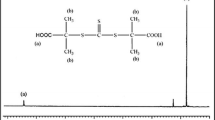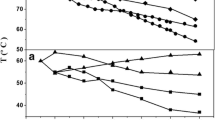Abstract.
The polymerization of acrylamide in an inverse microemulsion has been studied by time resolved fluorescence measurements. The reaction was initiated by thermal and by photochemical decomposition of the initiator AIBN. A decrease of the fluorescence lifetime of the probe molecule pyrenetetrasulfonic acid sodium salt was observed. In case of the photochemically initiated reaction two distinct lifetimes could be separated. The corresponding pre-exponential factors showed a good correlation with the gravimetrically obtained conversion. During the thermally initiated polymerization the fluorescence decays as well as the intensity of the scattered light were measured on-line and analyzed by a mono-exponential decay law.
Similar content being viewed by others
Author information
Authors and Affiliations
Additional information
Received: 3 November 1997/Accepted: 20 November 1997
Rights and permissions
About this article
Cite this article
Chung, MA., Adams, J. & Fuhrmann, J. Analysis of the microemulsion-polymerization of acrylamide by time resolved fluorescence. Polymer Bulletin 40, 195–202 (1998). https://doi.org/10.1007/s002890050242
Issue Date:
DOI: https://doi.org/10.1007/s002890050242




